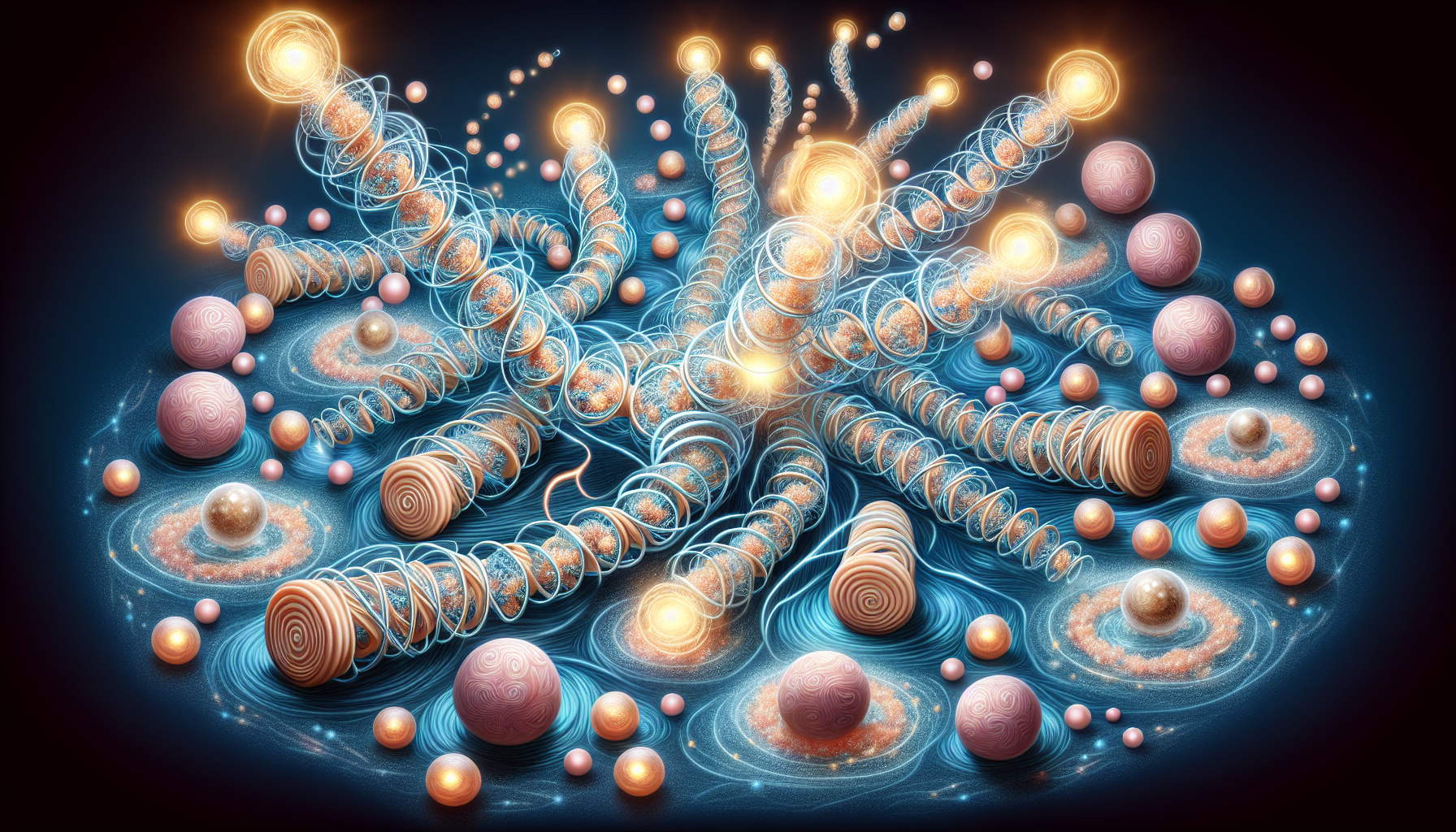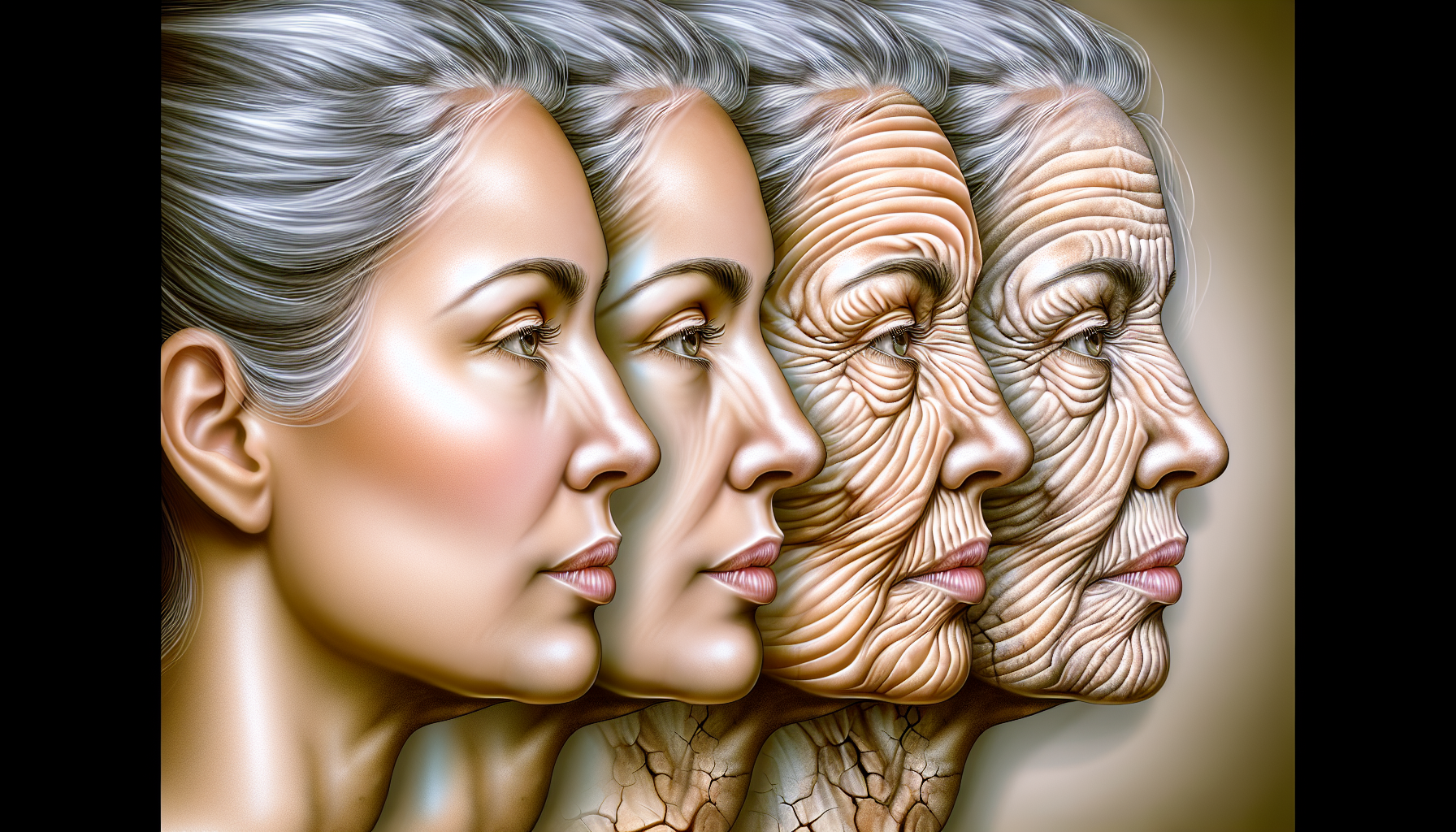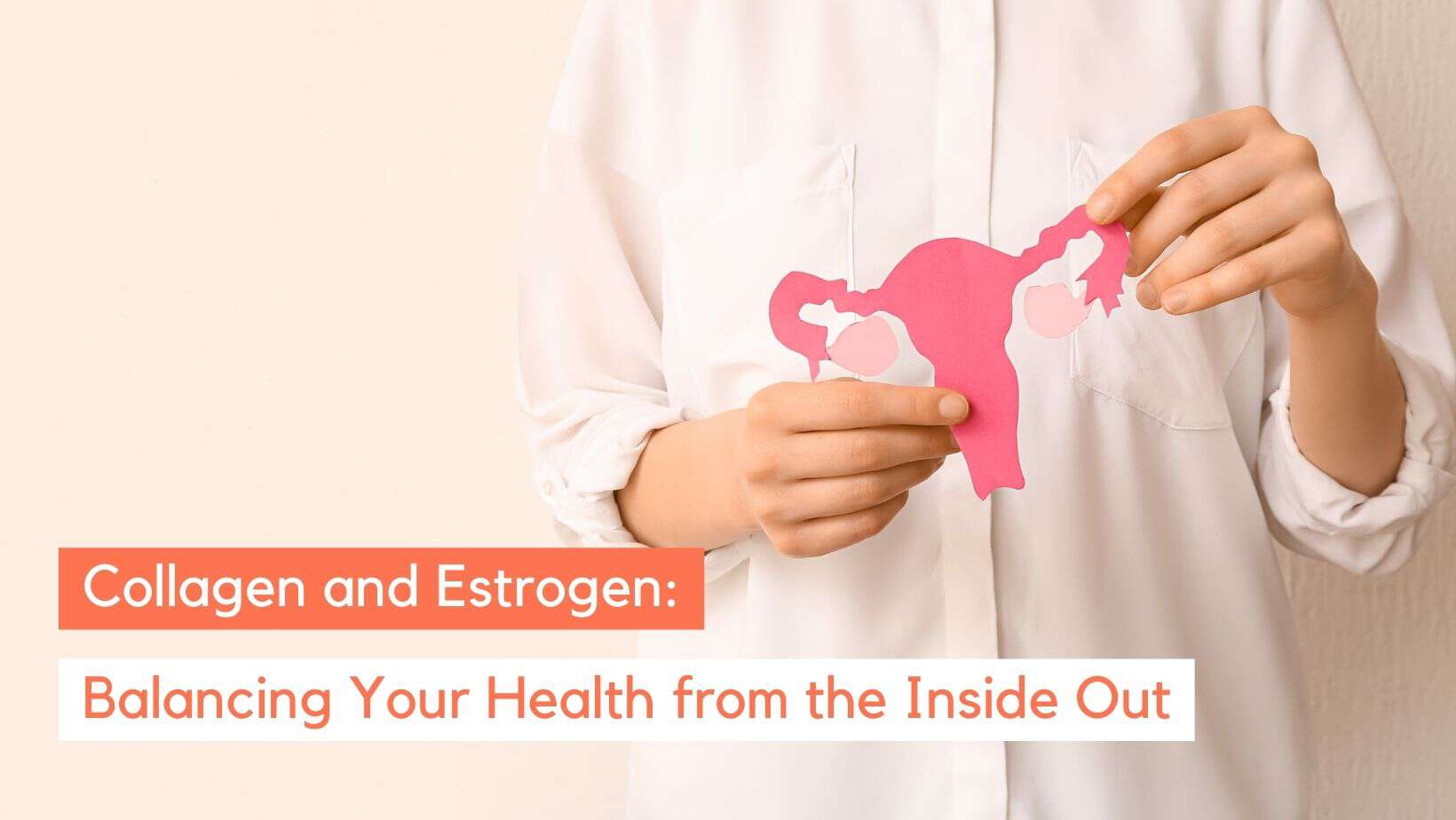Collagen and Estrogen: The Dynamic Duo for Women’s Health
Are you curious about the connection between collagen and estrogen, and how they interact to influence women’s health?
As the primary female sex hormone, estrogen plays a vital role in maintaining collagen production — a protein that gives our skin strength and elasticity.
But what happens as we age and estrogen levels decline?
This article delves into the intricate relationship between these two key players and offers insights into how declining estrogen levels lead to declining collagen production, affecting collagen synthesis, skin health, and overall well-being throughout different phases of a woman’s life.
 In the human body, collagen is an abundant protein present in connective tissues and plays a key role alongside estrogen—the main sex hormone in female bodies—in sustaining youthful skin. These two components interact significantly.
The function of estrogen extends to promoting the generation of collagen as well as managing enzymes that break down this vital protein, consequently affecting overall skin health.
Collagen itself provides:
In the human body, collagen is an abundant protein present in connective tissues and plays a key role alongside estrogen—the main sex hormone in female bodies—in sustaining youthful skin. These two components interact significantly.
The function of estrogen extends to promoting the generation of collagen as well as managing enzymes that break down this vital protein, consequently affecting overall skin health.
Collagen itself provides:
 The effect of diminished estrogen levels on skin health becomes especially evident as we age.
Post-menopause, the reduction in estrogen contributes to a thinner dermis, reduced skin thickness and elasticity, along with declining collagen production, which expedites the aging process of the skin.
There is hope. By supplementing with collagen, it’s possible to enhance hydration, bolster thickness, and improve elasticity in aging skin.
This can combat the negative impacts that come with falling estrogen levels. It essentially acts like rewinding your skin’s clock to revive some of its former vibrancy and resilience.
The effect of diminished estrogen levels on skin health becomes especially evident as we age.
Post-menopause, the reduction in estrogen contributes to a thinner dermis, reduced skin thickness and elasticity, along with declining collagen production, which expedites the aging process of the skin.
There is hope. By supplementing with collagen, it’s possible to enhance hydration, bolster thickness, and improve elasticity in aging skin.
This can combat the negative impacts that come with falling estrogen levels. It essentially acts like rewinding your skin’s clock to revive some of its former vibrancy and resilience.

Key Takeaways
- Estrogen is critical for collagen production, but levels decline with age, reducing collagen synthesis and causing signs of skin aging.
- Collagen supplements can improve skin health, bone density, and weight management, but should be part of a nutrient-rich diet.
- Clean Sourced Organic Collagens Powder offers a comprehensive blend of five collagen types from real food sources, supporting various aspects of health.
- Consult a healthcare professional before starting collagen supplementation, particularly if you have a history of breast cancer, to ensure it aligns with your individual health needs and goals.
- Estrogen is important for health in both women and men, impacting collagen and overall wellbeing.
The Synergy of Collagen and Estrogen in Female Bodies
 In the human body, collagen is an abundant protein present in connective tissues and plays a key role alongside estrogen—the main sex hormone in female bodies—in sustaining youthful skin. These two components interact significantly.
The function of estrogen extends to promoting the generation of collagen as well as managing enzymes that break down this vital protein, consequently affecting overall skin health.
Collagen itself provides:
In the human body, collagen is an abundant protein present in connective tissues and plays a key role alongside estrogen—the main sex hormone in female bodies—in sustaining youthful skin. These two components interact significantly.
The function of estrogen extends to promoting the generation of collagen as well as managing enzymes that break down this vital protein, consequently affecting overall skin health.
Collagen itself provides:
- Strength
- Support
- Elasticity
- Flexibility
The Role of Estrogen in Collagen Synthesis
Estrogen plays a crucial role in maintaining collagen production by binding to specific receptors on fibroblasts, the cells responsible for creating collagen within the skin. This interaction is key to keeping skin resilient and elastic. As women grow older and transition into menopause, they experience a natural decline in estrogen levels which leads to decreased synthesis of collagen. To mitigate this drop in collagen due to falling estrogen levels during aging, certain measures can be taken. For example, applying topical creams containing estrogen or undergoing hormone therapy specifically for menopausal women can help elevate the amount of collagen present in their skin. It’s imperative that any such treatments are administered with professional medical advice to effectively tackle declining collagen production.Estrogen Deficiency and Its Effect on Collagen
A lack of estrogen, especially during menopause, crucially affects the body’s collagen production capacity. This shortage of estrogen essential for fibroblasts results in a marked decline in collagen synthesis, which becomes evident through aging skin and brittle bones. It is worth noting that some women may begin to go through perimenopause—a stage leading up to menopause—as early as their mid-thirties. During this period, they start experiencing a drop in estrogen levels, which leads to decreased collagen levels. It’s imperative for women at this juncture to proactively address skin health maintenance and overall wellness. Treating estrogen deficient skin with specific skincare products and ingredients, such as MEP Technology and topical estriol cream, can help stimulate collagen production and promote skin health during menopause.Collagen Supplementation: Aid for Estrogen Deficient Skin
Collagen supplementation plays a crucial role in maintaining skin health, especially under conditions of estrogen deficiency. It greatly enhances the hydration, thickness, and elasticity of the skin. Research indicates that taking collagen hydrolysate supplements may curb body weight gain and decrease adipocyte size when there’s a lack of estrogen. Non-hormonal treatments, such as MEP Technology and topical estriol cream, are also effective in treating estrogen-deficient skin by aiding estrogen receptors to stimulate collagen production and promote skin health during menopause. Ingesting up to 15 grams of collagen every day is deemed safe and advantageous for promoting skin elasticity as well as general wellness. Studies have explored how collagen supplementation could alleviate obesity linked to a deficit in estrogen by mitigating both increased weight gain and growth in fat cell size.Types of Collagen Supplements
Selecting an appropriate collagen supplement is crucial to optimize its advantages. The market offers two prevalent forms, which are hydrolyzed collagen supplements and nano-hydrolyzed collagen supplements. Hydrolyzed collagen peptides offer the added benefit of enhanced digestibility and absorption. To put it simply, hydrolyzed collagen.- has been reduced into shorter chains of amino acids
- simplifies assimilation by the body
- enables faster and more effective utilization of supplied collagen
- results in benefits that are more readily apparent
Clean Sourced Organic Collagens Powder: A Comprehensive Collagen Supplement
If you’re looking for a high-quality, all-in-one collagen supplement, consider Clean Sourced Organic Collagens Powder. This product offers a blend of five collagen types (I, II, III, V, and X) derived from four real food sources:- beef,
- chicken,
- fish,
- and eggshell.
Collagen’s Role in Hormone Replacement Therapy
Incorporating collagen supplements can be highly beneficial when used alongside hormone replacement therapy, which typically involves the use of artificial estrogen variants. Notably, studies have shown that skin collagen may augment by as much as 6.49% following half a year of undergoing estrogen treatment. Thus, when addressing issues related to estrogen-deficient skin and mitigating the impact of lowered levels of this hormone on the skin’s health, utilizing both collagen supplementation and hormone replacement therapy might prove to be an effective strategy. It is crucial to seek advice from a healthcare provider before initiating any new healthcare approach.Estrogen and Collagen’s Impact on Aging Skin
 The effect of diminished estrogen levels on skin health becomes especially evident as we age.
Post-menopause, the reduction in estrogen contributes to a thinner dermis, reduced skin thickness and elasticity, along with declining collagen production, which expedites the aging process of the skin.
There is hope. By supplementing with collagen, it’s possible to enhance hydration, bolster thickness, and improve elasticity in aging skin.
This can combat the negative impacts that come with falling estrogen levels. It essentially acts like rewinding your skin’s clock to revive some of its former vibrancy and resilience.
The effect of diminished estrogen levels on skin health becomes especially evident as we age.
Post-menopause, the reduction in estrogen contributes to a thinner dermis, reduced skin thickness and elasticity, along with declining collagen production, which expedites the aging process of the skin.
There is hope. By supplementing with collagen, it’s possible to enhance hydration, bolster thickness, and improve elasticity in aging skin.
This can combat the negative impacts that come with falling estrogen levels. It essentially acts like rewinding your skin’s clock to revive some of its former vibrancy and resilience.
Strategies to Boost Collagen Production
Taking collagen supplements can furnish your body with the needed collagen, but they aren’t the sole method to promote increased production of collagen. Consuming a diet abundant in nutrients is key for boosting natural collagen synthesis. Key vitamins and minerals necessary for mitigating dry skin and enhancing the body’s ability to produce collagen encompass:- Vitamin A
- Vitamin C
- Vitamin D
- Vitamin E
- Zinc
- Selenium
- Omega‑3 fatty acids
Can Collagen Influence Hormonal Balance?
Apart from its benefits for skin health, taking collagen supplements might play a role in promoting hormonal equilibrium. Specifically, such supplementation could assist in elevating estrogen levels by combating decreased estrogen production. Due to the anti-inflammatory attributes of collagen, it may lessen menstrual pain and ease feelings of fatigue while helping to regulate emotional fluctuations associated with hormone cycles. Collagen includes tyrosine, an essential building block for dopamine, which may aid in mood stabilization and possibly diminish stress. Hence, incorporating collagen into your regimen could prove beneficial for maintaining overall hormonal health and wellness.The Risks and Rewards of Collagen for Joint and Bone Health
Collagen supplements offer advantages that go beyond just improving skin health. They are particularly beneficial for joint and bone well-being, which is critical for postmenopausal women who face a higher likelihood of osteoporosis as their estrogen levels diminish. Research has demonstrated the efficacy of collagen supplements in promoting bone growth and increasing bone mineral density. Certain peptides found in collagen have been identified to encourage the formation of bones while simultaneously decreasing their degradation. It’s essential to acknowledge, though, that these supplements should complement rather than substitute a well-rounded diet or consistent physical activity when looking to maintain healthy bones.Estrogen, Collagen, and Cardiovascular Health
Estrogen and collagen may not typically be at the forefront of our thoughts regarding cardiac wellness, yet estrogen is essential for sustaining proper blood vessel functioning and modulating vascular tone, which affects heart health. The decline in estrogen as women grow older reduces its anti-inflammatory benefits that are crucial to cardiovascular well-being. This underscores the need to monitor and manage estrogen levels when addressing cardiovascular risk factors, emphasizing once again how critical it is to maintain the delicate equilibrium of hormones and proteins within our bodies.Addressing Weight Management: Collagen’s Role in Promoting Weight Loss
Exploring the role of collagen in weight management presents a promising avenue. Its influence on satiety hormones may aid in weight loss by fostering a prolonged sense of satisfaction after eating. Research has shown that consuming breakfast with collagen can be 40% more filling than meals lacking this protein, which results in decreased food consumption later. Through boosting satiety hormones, collagen could play a significant role in curbing appetite and diminishing overall calorie intake. Such evidence points to the beneficial impact that incorporating collagen supplementation might have within a dietary strategy focused on losing weight.Collagen and Estrogen’s Effects on Mental and Digestive Health
Collagen and estrogen have a significant role in enhancing both mental wellness and digestive health. Improved sleep quality and psychiatric health are associated with collagen supplementation, which aids mental well-being. The presence of glycine in collagen supports brain health and may help reduce symptoms related to psychiatry. By strengthening the soft tissues within the intestinal wall and stomach, collagen facilitates smoother operations along the digestive tract, thus positively influencing gut health. Collagen supplementation is also deemed safe for consumption during pregnancy and breastfeeding—periods that can be quite stressful for numerous women.Collagen Supplementation and Breast Cancer Cells
It is imperative to recognize that the safety of collagen supplements for individuals with breast cancer remains unclear. These supplements pose various risks such as containing substances whose effects are not well known, not being reviewed by the FDA, and possibly including harmful contaminants. Consequently, it is vital for patients to seek medical advice prior to using these products. Elevated amounts of collagen-I within the tumor microenvironment have been linked to increased aggression in breast cancer cells. As a result, people with past incidents of breast cancer or those seeking enhanced muscle mass should proceed with extreme caution and always consult healthcare professionals before initiating any new supplement regimen.Summary
To sum up, the dynamic duo of collagen and estrogen plays an instrumental role in women’s health, influencing everything from skin elasticity to bone health, and even weight management. Incorporating a collagen-rich diet and considering collagen supplementation can help counter the effects of declining estrogen levels, especially in postmenopausal women. However, given the potential risks associated with certain health conditions like breast cancer, it’s crucial to consult with a healthcare professional before starting any new supplementation regimen. Experience the potential benefits of this all-in-one collagen supplement by trying Clean Sourced Organic Collagens Powder todayFrequently Asked Questions
How does estrogen affect collagen production?
Binding to receptors located on fibroblasts, which are the cells tasked with collagen creation in the skin, estrogen plays a critical role in promoting collagen production. With advancing age in women comes a natural diminishment of estrogen levels, resulting in declining collagen production. This reduction in collagen can lead to symptoms such as skin sagging, wrinkles, hair loss, and joint pain.Can collagen supplements help with skin aging?
Yes, collagen supplements can help improve the hydration, thickness, and elasticity of aging skin, reversing the detrimental effects of declining estrogen levels.Can collagen supplementation influence hormonal balance?
Collagen supplementation might positively affect hormonal equilibrium by assisting in the management of diminished estrogen levels, easing menstrual discomfort, and controlling mood fluctuations. This could be advantageous for maintaining hormonal health.What are the benefits of collagen for bone health?
Collagen supplements can enhance bone mineral density and stimulate bone formation, offering particular benefits to postmenopausal women at risk of osteoporosis.Is collagen supplementation safe for breast cancer patients?
It is imperative for patients with breast cancer to seek advice from healthcare professionals before contemplating collagen supplementation, due to the unclear implications on safety.Organixx Clean Sourced Collagens blend contains five types of collagen from four sources. What’s more, it’s combined with targeted nutrients such as zinc, vitamin C, and vitamin B6 which specifically enhance the bioavailability and potency of collagen. Clean Sourced Collagens is formulated from the ground up to enhance and support your body’s natural ability to heal and rebuild itself from the INSIDE out.




Comments